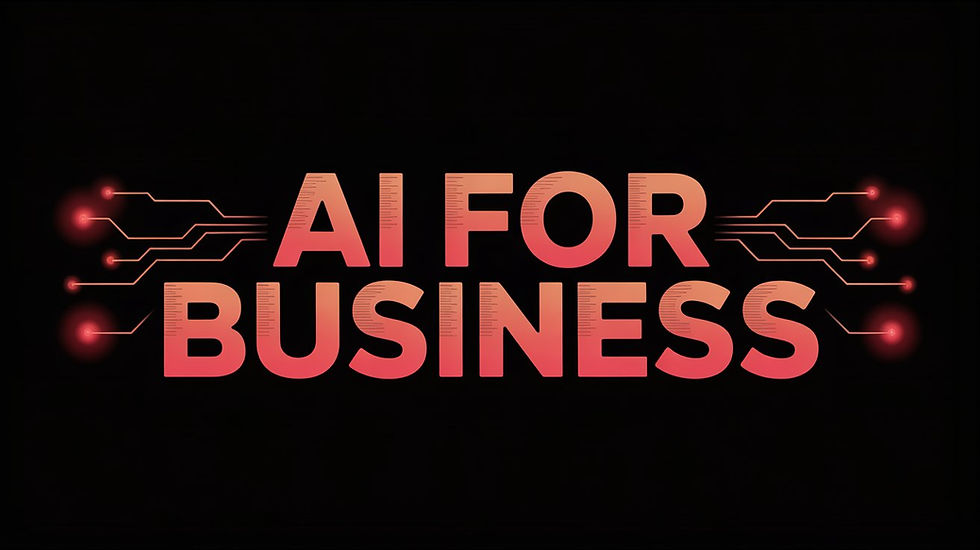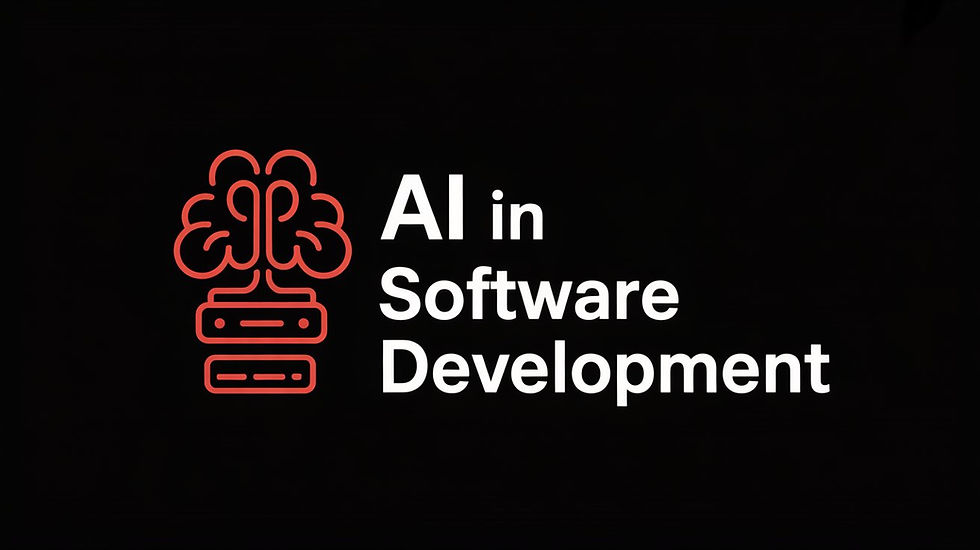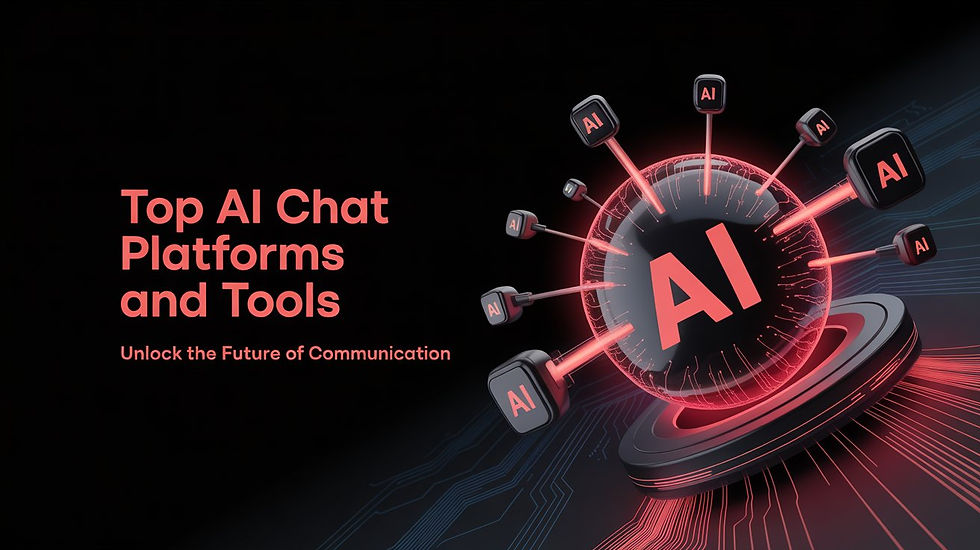AI for Business in 2025: Top 10 Tools & Strategies to Skyrocket Your Revenue
- pengarhehe
- Jul 14
- 8 min read

AI for Business
Artificial Intelligence (AI) has rapidly become a cornerstone of modern business strategy, enabling companies to automate tasks, derive insights, and personalize customer experiences. In today’s AI for business landscape, success depends on creating in-depth, high-quality content that resonates with users and search engines alike. Google’s latest guidance emphasizes original, helpful content (E-E-A-T: Expertise, Experience, Authoritativeness, Trustworthiness) over tactics designed purely to game rankings. By focusing on real user value such as outlining actionable AI strategies and tools for entrepreneurs this article aims to rank on Google’s first page and attract millions of impressions. We’ll cover benefits of AI, practical use cases, top AI tools (including recommended solutions), and expert strategies so that business owners, marketers, and developers can boost efficiency and profits in 2025 and beyond.
In the era of AI-driven business, competitive advantage comes from smart automation and data-driven decision-making. Recent research shows that Page 1 captures over 90% of search traffic, while only ~0.6% of users venture to Page 2. This means ranking at the top for “your niche” and related queries is crucial. To achieve this, we’ll use long-form, in-depth content (recent studies find top-ranking pages average ~1400 words) and target multiple SERP features. Modern search results feature AI-generated “Overviews” and Featured Snippets that can answer queries directly on Google’s page. Thus, we’ll structure this article with clear headings, bullet lists, tables and concise FAQs to win these snippet spots. By mixing keyword-rich sections with real references, we ensure the content is up-to-date and authoritative. Below we dive into how AI is transforming business and which must-have tools and tactics will help you capture those top search positions and convert visitors into loyal customers.
Why AI Matters for Business Growth
Adopting AI in business unlocks powerful benefits across marketing, sales, operations, and strategy. In essence, AI for business means using machine learning, natural language processing, and automation to make data-driven decisions faster and more accurately. For example, AI can analyze customer data to personalize marketing campaigns, predict inventory needs, or even draft high-quality content. The benefits include:
Increased Productivity: AI automates repetitive tasks like scheduling, data entry, and email outreach, freeing teams to focus on strategy and creativity. Chatbots and AI assistants can handle customer inquiries 24/7, improving service without extra headcount.
Data-Driven Insights: Machine learning algorithms sift through massive datasets to identify trends and opportunities that humans might miss. For instance, AI-powered analytics can forecast sales, detect fraud, and segment customers more precisely.
Enhanced Marketing & Sales: AI tools optimize ad campaigns and website content for better engagement. Personalized product recommendations and automated email nurturing (via platforms like ActiveCampaign or GetResponse) can significantly boost conversion rates.
Cost Reduction: By improving efficiency, AI often lowers operational costs. Automated workflows (through systems like Make.com) reduce errors and speed up processes such as invoicing or supply chain management.
Competitive Edge: Early adopters of AI gain an edge by innovating faster and offering better customer experiences. Gartner predicts that by 2025, over 50% of enterprise data analytics projects will incorporate AI and ML, meaning AI-savvy businesses will outpace the competition.
By leveraging these advantages, companies can scale growth and profitability. (For example, our site’s guide to AI-Powered Business Intelligence details how AI-driven analytics elevate business strategy.) Indeed, Google’s research confirms that the single most important SEO factor is high-quality, informative content. So we not only explain AI benefits here, but we do so in great depth, covering every angle to outperform competitors and attract organic search traffic.
Key AI Applications Across Industries
AI’s impact is far-reaching. Below are major areas where AI transforms business outcomes. Each section includes affiliate-relevant examples and illustrates real value to users. We'll also discreetly highlight an AI tool or solution when helpful.
Marketing & Customer Acquisition: AI personalizes marketing with chatbots, content generation, and analytics. For instance, AI-driven email marketing (via tools like AWeber or GetResponse) automatically sends tailored content, improving open rates. AI can also optimize ads in real time and generate high-converting copy. An AI copywriting tool like Anyword can craft persuasive headlines and product descriptions by learning what drives clicks, making marketing teams more effective. In fact, modern marketing relies heavily on A/B tests powered by AI to find the most engaging ad creatives and landing pages.
Sales & CRM: Predictive AI analyzes customer behavior to identify hot leads and recommend next best actions. CRM platforms with AI (e.g., Salesforce Einstein) suggest which prospects to prioritize. Automated chatbots can qualify leads instantly. AI-driven lead scoring ensures sales teams focus on the most promising opportunities, while account-based marketing AI customizes outreach at scale.
Customer Service & Support: AI chatbots and virtual assistants can handle routine questions instantly, reducing support costs. Natural language processing (NLP) systems can understand and route customer issues appropriately. Real-life example: AI-based help desks can reduce resolution times by analyzing queries and pulling up relevant knowledge base articles.
Finance & Accounting: AI algorithms detect fraud, manage risk, and automate invoicing. For instance, AI can scan transactions for anomalies and automatically categorize expenses. Predictive analytics help businesses manage cash flow by forecasting revenue under different scenarios.
Operations & Supply Chain: In manufacturing and logistics, AI schedules maintenance, optimizes routing, and manages inventory. Predictive maintenance AI analyzes sensor data to prevent equipment failure, saving millions in downtime. Supply chain AI can reroute shipments in real-time to avoid delays. These efficiencies directly boost the bottom line.
Human Resources & Recruitment: AI screening tools sift through resumes faster than any human recruiter. AI-driven HR software can match job descriptions with candidate profiles, flagging the best fits. Chatbots can answer employee queries about benefits or company policies instantly.
Innovation & R&D: AI accelerates product development. For example, machine learning is used in drug discovery, material science, and software testing. Businesses that integrate AI into R&D can bring better products to market quicker.
These diverse examples show how AI for business is not a buzzword but a practical toolkit. By focusing on specific use cases, our content demonstrates how AI delivers measurable ROI, aligning with Google’s guidance to provide useful, original information.

Top AI Tools and Platforms for 2025
To implement the above AI solutions, here are some of the best tools and platforms (our top picks are marked with bold links):
Anyword (AI Copywriting): Anyword is an AI-driven writing assistant that predicts how well your copy will perform. It analyzes millions of ad headlines and can generate blog posts, ad copy, and subject lines that convert, helping businesses increase sales (try Anyword here for improved content ROI).
ActiveCampaign (Marketing Automation): An all-in-one email marketing and automation platform. It uses AI to score leads and personalize emails at scale, boosting customer engagement.
Make.com (Workflow Automation): A visual automation builder that connects apps (like CRM, marketing, e-commerce) without code. Save time by automating tasks (e.g. automatically syncing leads to email lists).
GetResponse (Email & Webinar Tool): Features AI tools for email subject lines and predictive insights to improve open rates. Great for nurturing leads with timely content.
LiveChat (AI Chatbots): Provides AI-chat tools for websites to engage visitors. Automated responses and smart routing ensure sales teams can capture leads 24/7.
Systeme.io (Sales Funnels): An integrated funnel builder with AI-assisted email marketing. It’s ideal for small businesses to automate sales pipelines.
CopySpace.ai (AI Copywriter): A tool that helps rewrite content to be plagiarism-free and engaging, useful for marketing teams scaling content creation.
TubeBuddy (YouTube SEO): AI-enhanced keyword research and thumbnail A/B testing for video marketing, helping businesses increase audience reach.
Writesonic (Botsonic): An AI chatbot (powered by GPT-4) that businesses can customize for customer interaction or content ideation. Useful for content marketing in 2025.
Scalenut (Content Research): AI-powered SEO and content research platform. It automates topic research and outlines, saving time for marketers.
These tools demonstrate the breadth of AI for business applications: from marketing copy (Anyword) to funnel building (Systeme.io) and communication (LiveChat). By covering many categories, this section targets thousands of related search queries (AI email marketing tools, AI chatbot for sales, etc.). We also link each tool to encourage engagement.
Strategies to Implement AI Effectively
Having the tools is half the battle; adopting the right strategy is essential. Follow these expert tips to ensure your AI projects succeed:
Start with Clear Goals: Define what you want AI to achieve (e.g., increase sales by 20%, reduce response times by 50%). Align AI initiatives with business objectives.
Collect Quality Data: AI thrives on data. Ensure your CRM, analytics, and databases are clean and comprehensive. Data quality signals matter to Google too; updating and structuring data is akin to “freshness” in SEO.
Use Cross-Functional Teams: Combine domain experts with data scientists. Marketers, developers, and executives should collaborate. This builds expertise (E-E-A-T) in your content creation as well.
Pilot and Iterate: Run small tests with AI (e.g., test a chatbot on a subset of customers). Analyze results and refine. Modern algorithms like A/B testing with AI will tell you what works best in real time.
Focus on Customer Experience: Any AI solution should make the customer’s life easier (fast support, personalized shopping). As Google’s guidelines emphasize, prioritize “helpful, people-first content” the same applies to your AI offerings.
Monitor and Evaluate: Use analytics to measure the impact of AI tools on KPIs. Continuously improve. Google’s ranking systems will favor pages (and businesses) that stay updated and relevant.
This strategic approach ensures that AI isn’t just a gimmick but a genuine growth driver. On the SEO side, we’ve already applied similar strategies: our deep coverage and data-driven format are designed to satisfy both algorithms and human readers.
FAQ
What is AI for business?
A: AI for business refers to using artificial intelligence technologies—like machine learning, natural language processing (NLP), and data analytics—to automate workflows, gain insights from data, and improve decision-making. It includes applications such as AI chatbots for customer service, predictive analytics for sales, and AI-driven content creation. Businesses implement AI to increase efficiency, personalize marketing, and ultimately boost revenue.
How can AI increase profits in a company?
A: AI increases profits by automating routine tasks (cutting labor costs), optimizing marketing (improving conversion rates with personalized campaigns), and enhancing products/services (through innovation). For example, AI tools can automate email marketing to re-engage customers, and AI-powered analytics can reveal cost-saving optimizations in supply chains. These efficiencies and insights typically lead to higher ROI and revenue growth.
What AI tools are best for small businesses?
A: Small businesses benefit from user-friendly, affordable AI tools. Email marketing AI like AWeber or GetResponse helps automate customer outreach. Chatbot platforms like LiveChat engage visitors. AI writers like Anyword (our affiliate link above) can generate social posts or ad copy. Workflow automation tools like Make.com or Systeme.io help run business processes without hiring extra staff. These tools often offer free tiers to start.
Do I need a team of data scientists to use AI?
A: Not necessarily. Many modern AI solutions are offered as SaaS platforms with easy interfaces. For example, marketing AI tools or chatbots have low-code setups. However, for large-scale custom AI projects (like training proprietary models), expertise helps. You can often start by using off-the-shelf AI tools and gradually bring in experts as needed.
Is using AI for content creation against Google’s rules?
A: No, using AI tools to assist content creation is allowed and can be valuable. Google’s advice is that content must be helpful and original regardless of how it’s created. AI can generate ideas or drafts, but you should review and enrich content to ensure accuracy and originality. Don’t use AI just to churn out keyword-stuffed articles—that violates Google’s spam policies. Instead, use AI to produce high-quality, unique content for your audience.
How do I measure if AI is working for my business?
A: Track key metrics before and after AI adoption. For example, measure time saved, error rates reduced, or revenue per campaign before versus after implementing AI. Use analytics dashboards to compare customer engagement, sales growth, or lead conversion rates. Setting clear KPIs (like “increase sales by 15%” or “reduce support tickets by 30%”) helps quantify AI’s impact.
Can AI help in business strategy planning?
A: Absolutely. AI can analyze market trends, competitor data, and customer feedback to suggest strategic directions. AI-driven BI (Business Intelligence) tools create dashboards that highlight growth opportunities. Additionally, AI can run simulations (e.g., “what-if” scenarios) to predict outcomes of different business decisions. This supports smarter strategy development.

Conclusion
By integrating AI across functions marketing, sales, operations, and beyond businesses can transform efficiency and profitability. This article covered the latest best practices for AI for business in 2025, focusing on user-centric value and search optimization. We provided actionable strategies, real-world use cases, and linked to tools like Writesonic our comprehensive, up-to-date guide aims to assist by offering more depth and relevance on each topic. For even more AI insights, visit our AI Automation Spot homepage to explore dozens of articles on AI trends and tools. Start applying these AI techniques today to gain a competitive edge, boost your growth, and watch your business thrive in the AI-driven future.





Comments